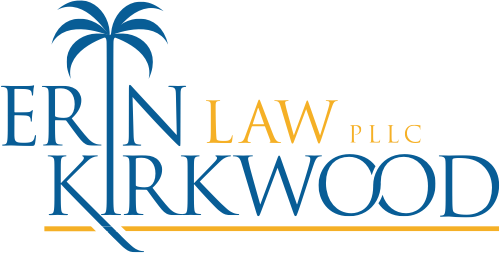Answers To Frequently Asked Questions About Consumer Bankruptcy
Erin Kirkwood Law, PLLC, provides help to Floridians who are struggling with overwhelming debt and need bankruptcy to find a fresh start. If you’re considering bankruptcy, it’s important to have the information you need to make an informed decision. After reading through the questions and answers provided below, contact attorney Erin Kirkwood to ask your own questions during a free 30-minute consultation.
Can I use credit cards to pay for bankruptcy filing fees and other costs?
Credit cards cannot be used to pay court costs in bankruptcy cases. Client credit cards also can’t be used for attorney’s fees. Cashier’s checks and cash are acceptable forms of payment for both the courts and your attorney. A family member or friend can use his or her credit card to pay the attorney’s fees for you.
What are the different kinds of bankruptcies? What type of bankruptcy is right for me?
Which kind of bankruptcy is right for you depends on a number of factors and is a decision that is best made in consultation with your bankruptcy attorney. There are two main types of consumer bankruptcies used by individuals: Chapter 7 bankruptcy and Chapter 13 bankruptcy. Erin can help you seek relief through Chapter 7 bankruptcy.
What is Chapter 7 Bankruptcy?
A Chapter 7 bankruptcy discharges your debt entirely at the end of the proceedings. However, the bankruptcy trustee can liquidate your property to try and pay off some creditors. You will come out of a Chapter 7 bankruptcy mostly debt-free, but it will be without some or most of your assets. For example, the trustee may take a motor home you own free and clear and auction it to pay off some of the discharged debt. While this may seem extreme, this type of liquidation of assets will help you come out of bankruptcy with a stronger financial foundation. There are several things the trustee cannot take, such as retirement accounts and homesteaded property. Keep in mind, however, that the bank can still foreclose on the house – so you’ll need to keep paying the mortgage if you want to keep the house. The analysis involved in a Chapter 7 bankruptcy can get quite technical, and you should have an experienced attorney by your side at the hearing with the trustee. Please feel free to schedule a no-cost consultation if you would like to discuss filing Chapter 7 bankruptcy.
How and when will the debt collector calls stop?
As soon as your bankruptcy case is filed with the court, an “automatic stay” is issued. Creditors are then notified of this automatic stay and required to stop trying to collect the debt. If your creditors ignore this order, your bankruptcy attorney will file a motion to stop the harassment and can seek damages from your creditors, if appropriate.
What kind of debts can I get rid of through bankruptcy?
These are the most common debts dischargeable in bankruptcy:
- Medical debts
- Credit card debt
- Car loans (but you don’t get to keep the car if the debt is discharged)
- Mortgage (but you don’t get to keep the house)
Are there debts I can’t get rid of through bankruptcy?
Yes, some debts cannot be discharged through bankruptcy. These debts include:
- Taxes
- Alimony
- Child support
- Student loans
If I file for bankruptcy, can I keep my car?
Yes. There are ways to keep your car through bankruptcy, but they all involve paying for it in some way. Whether keeping your car is your best option is something to discuss with your bankruptcy attorney. Keep in mind that it’s important to maintain insurance on the car throughout the process.
If I file for bankruptcy, can I keep my house?
Yes. There are ways to keep your home through bankruptcy but they all involve paying for it in some way. Whether keeping your house is the best option for you is something to discuss with your bankruptcy attorney.
Will my debts be gone forever?
Yes. Once the bankruptcy court enters its judgment discharging debts, those debts are gone forever.
Will I ever have credit again?
Yes, eventually. It will take at least one to two years until you may be able to get a credit card or mortgage. Whether you get credit again really depends on your financial behavior. The bankruptcy filing will stay on your credit report for seven to 10 years. However, most credit agencies will look at the most recent 18 to 24 months of credit history. So it’s important to begin rebuilding credit immediately. How can you do this? Get a secure credit card. Pay all your bills on time. Get a friend or family member to co-sign a car loan and then make the payments on time. Your credit future is in your hands after bankruptcy.
Find The Help You Need At Erin Kirkwood Law, PLLC
Bankruptcy laws are for the honest but unfortunate debtor. Erin Kirkwood Law, PLLC, was started to help people like you get a fresh start and a new lease on life. To schedule your free 30-minute consultation, call 772-732-8863 or reach out online.
Pursuant to Title 11 of the United States Code, Erin Kirkwood Law, PLLC, is a debt relief agency. Attorney Erin Kirkwood helps people file for bankruptcy relief under the Bankruptcy Code.

